In Long Branch, N.J., 26 years ago, nearly 30 buildings were boarded up around the three-story industrial building that stands at 179 Broadway. It was then a high crime area with more drug dealing than foot traffic, despite being just a few blocks from the beach. The area retained its rough edges even as recently as 2009, when local cops mistakenly arrested Bob Dylan for vagrancy, as New Jersey Repertory Company’s literary manager Joel Stone recalled with a chuckle in a recent interview.
“No one came into this neighborhood,” agreed the theatre’s executive producer, Gabor “Gabe” Barabas, then a local pediatric neurologist. But he came to the neighborhood, along with his wife SuzAnne, with whom he’d previously produced plays in Cincinnati and Philadelphia, in search of a theatre space. They found one when David and Margaret Lumia, the owners of a medical supply business that manufactured insulin pumps, felt they’d outgrown the building at 179 Broadway and were looking to donate the space to a nonprofit. The Lumias simply asked the Barabases to promise that they would make it work.
“I promised them,” said Gabe, “knowing that you can’t promise that sort of thing.”

They’ve made it work. New Jersey Rep opened in 1997 in the 9,000-square-foot building, with a mission to develop and produce new plays by emerging and established playwrights, to make a lasting contribution to the American stage, and to act as a catalyst for the revitalization and redevelopment of their community. They started with a series of free weekly readings and gradually developed a subscription audience while aggressively seeking contributed funds from various corporate, individual, and institutional sectors.
The ground floor soon became home to a reading space as well as the 68-seat Lumia Theatre. Their first reading in May 1998 was of Joel Stone’s play, Horrors of Doctor Moreau. Stone had known SuzAnne since grade school. He’s been with the company ever since.
As of 2022, New Jersey Rep had a budget of more than $900,000, nearly triple what it was in 2002. In the last 26 years, the theatre has produced 140 new plays, 125 of them world premieres. About 40 percent of their mainstage shows start out as developmental readings, of which they’ve hosted more than 400, in addition to their various festivals. New Jersey Rep premieres have led to over 300 subsequent productions. Over the years since they started out, Gabe said, “We have found that our theatre is much bigger than our four walls. Because the other thing we bought into is that we have an obligation to promote the plays beyond our production. We’ve had so many partnerships, and so many subsequent productions, that we’ve envisioned our theatre as being as big as the realm of the imagination. We’re contributing to plays that are going to be picked up by other theatres. So we can’t just think about our moment, because there’s moments beyond our moment.”
Now a blithe philosopher with big ideas and the enthusiasm to match, Gabe worked as a pediatric neurologist for 30 years before a stroke 15 years ago led him to dedicate the next phase of his life to the arts, and to his wife, the company’s artistic director and a longtime theatremaker, who studied with Lee Strasberg. SuzAnne is a warm, affectionate matriarch figure, while also being an artist of discerning taste.

“It is a true mom-and-pop organization,” said playwright Michael Tucker, who’s had three plays premiere at New Jersey Rep. Most recently, his two-hander A Tailor Near Me, starring James Pickens Jr. and Richard Kind, had a sold-out run. “You have the artistic director of the theatre selling every ticket, and she’s in the box office. When you come to that theatre, you’re handled beautifully by the people who run it. I think of them as my grandparents, although they’re both younger than I am.”
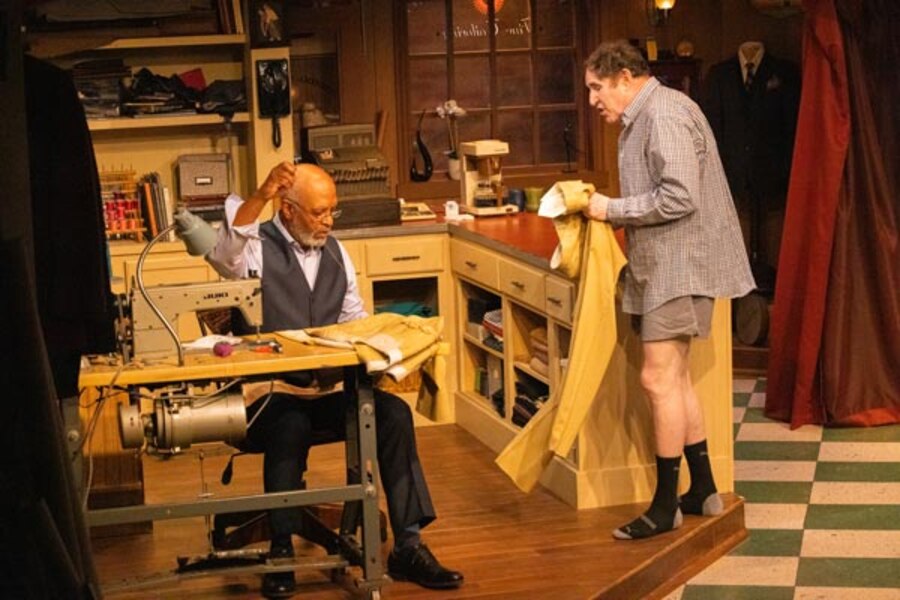
Indeed, while Gabe and I sat talking just beyond the lobby in the theatre’s reading space, SuzAnne stepped into the box office to call some names on the waiting list and let them know that a seat had opened up for that evening’s performance. It was quickly filled. New Jersey Rep doesn’t need physical tickets: Audience members simply show up at the door and SuzAnne greets them, a tight list of 68 names in hand, though most are already familiar faces. Like everyone’s surrogate grandmother preparing for a road trip, she kindly nudges each guest to visit the restroom before the performance, as there will be no intermission. The show starts when everyone is seated. While many theatres use a 10-foot rule to gauge the ideal distance to the audience’s eyes, this theatre has a 3-foot rule, which, the designers will tell you, requires immense attention to detail.
“I love the intimacy of watching shows in that small of a space,” said resident lighting designer Jill Nagle. “There’s nothing like it. It’s like you’re in somebody’s living room watching a really good production.”
In addition to its homegrown atmosphere, New Jersey Rep has a crack team of resident designers. Nagle, along with costume designer Patricia E. Doherty and scenic designer Jessica Parks, have all worked for the company for the past 20 years.
“It’s an artistic home,” said Doherty. “The LORT theatres and so many other theatres have really gotten away from the original intent of the regional theatre resident company model.” New Jersey Rep, by contrast, has retained a core company of artists who keep coming back. In this artistic playground, the designers have achieved everything from a running stream to a working stove, falling snow to a growing forest, even an entire Jaguar sedan.
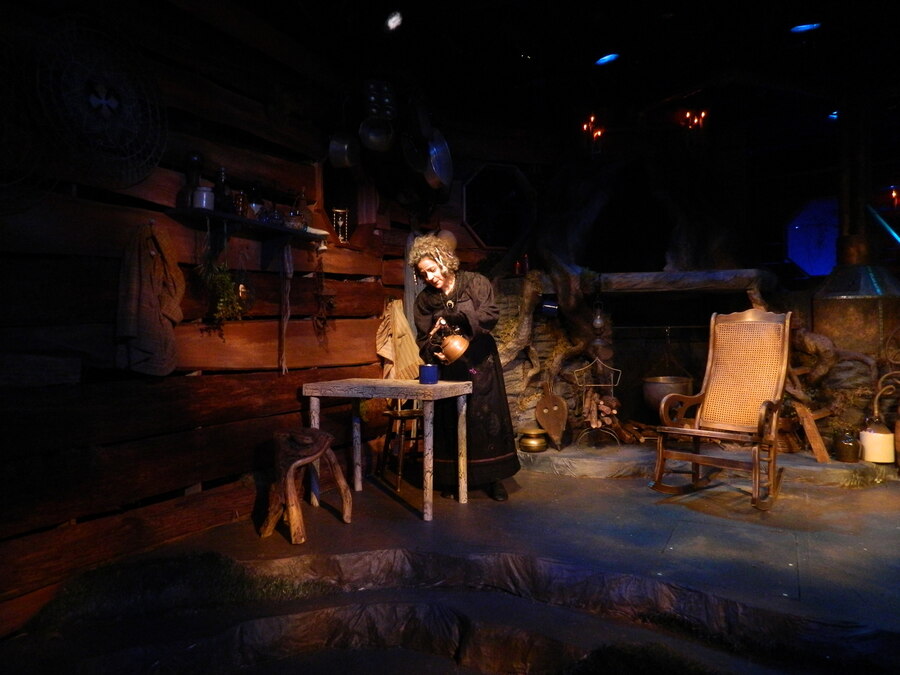
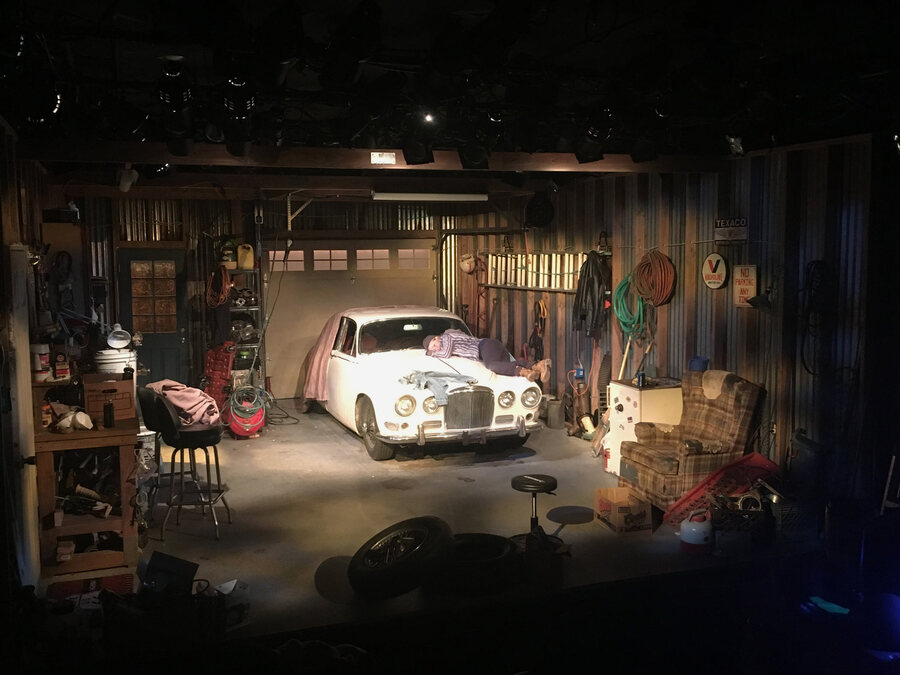
Parks said her commitment to the company is driven not only by the chance to experiment in a fairly low-stakes space, but also by the ability to work with first-rate theatre artists “who have all somehow found themselves in this little gem in New Jersey.”
“Gem” is a word that came up repeatedly when discussing New Jersey Rep. Actor Richard Kind’s father was a jeweler in Princeton, so the analogy came naturally.
“That’s what this theatre is,” Kind told me before a closing performance of Tailor earlier this month. “It’s not a big, honkin’ theatre. It’s a beautiful little gem where you can come and do really good work, work hard, and, you hope, produce a gem.”
Playwright Steve Braunstein, whose play The Tangled Skirt premiered at New Jersey Rep in 2011 and recently racked up its 25th production across the country, said, “I always think of it as a jewel box theatre. It’s small, but it has a lot of punch and a lot of glitter.”
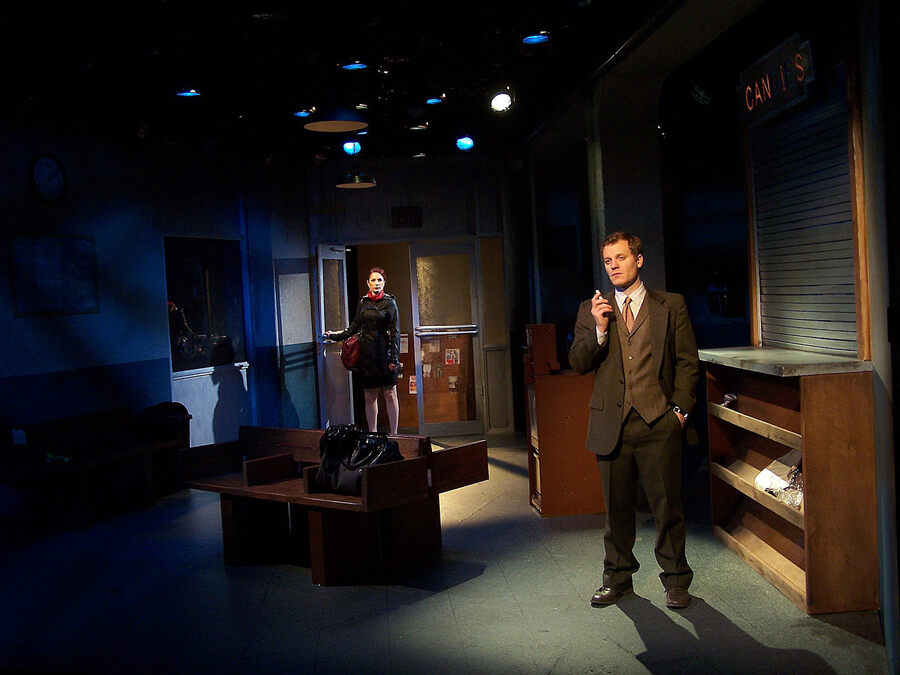
New Jersey Rep may be small, but it’s not quaint.
“The plays we do are not necessarily the plays that at first blush would prompt a segment of the populace to seek us out,” explained Gabe. “We have done plays that at various times other theatres might not touch. We have done surreal and inaccessible plays, because we felt that the playwright’s voice needed to be heard, and that we would champion it and put ourselves behind it to see what happens. It’s the work that speaks for us.”
Up until 2019, New Jersey Rep had an open submission policy for plays, regularly receiving more than 750 scripts each year. While they’ve since narrowed down their criteria to full-length plays featuring four characters or less, and can only accept submissions from agents, managers, and industry professionals, this doesn’t stop them from taking risks. Take John Biguenet’s Broomstick from 2013, for instance, a fantastically witchy solo fairy tale with virtually no stage directions. Or Marisela Treviño Orta’s Wolf at the Door from 2018, inspired by Latino folklore and mythology. Or this year’s U.S. premiere of Garret John Groenveld’s The Hummingbirds, a futuristic comedy about unemployment.
The ability to take these risks derives from a decades-long practice of getting to know their patrons and cultivating an open-minded audience.
“This audience has been developed over 26 years to look forward to seeing something they’ve never heard of, to open their minds to whatever it might be that comes their way,” said Tucker. “It’s a wonderful audience to play to.” Tucker came to know the company through his wife, actress Jill Eikenberry, who has also performed there. Though it’s more than a three-hour drive to Long Branch from their home Connecticut, Tucker said they gladly keep coming back.
Several playwrights marveled that New Jersey Rep hasn’t lost its focus or exceeded its capacity. While many theatres feel the need to expand, sometimes beyond their means, Gabe and SuzAnne have intentionally stayed small. Inspired by the Edinburgh Festival Fringe’s use of small spaces, SuzAnne believes that bigger isn’t necessarily better in the theatre.
“It was intentional to keep it intimate, because our mission is to do new works,” she said. While it’s much easier to fill a large house with a well-known musical or something fresh out of a major city, New Jersey Rep employs working actors and playwrights who aren’t always huge stars. “When you want to do new works, you have to reinvent the wheel every single time.”
“I think they’re doing something that has unfortunately become remarkable these days,” said playwright Richard Dresser, “which is to be totally committed to new plays, and also to be truly supported by the community.”

Dresser’s play Our Shrinking, Shrinking World had its premiere at New Jersey Rep in May, and his play Closure debuted there in 2015. He recalled the experience of staying with the cast in the theatre’s company house, formerly owned by the manager of Buffalo Bill’s Wild West show, where out-of-town artists can stay for the run of each production. Though Long Branch is about 90 minutes away from New York City, Dresser said he appreciates the distance.
“I’ve always found it more productive to work outside New York than in New York,” Dresser said, “because when you’re in New York, everyone’s going home at the end of rehearsal. If you’re out of town and rehearsal is over, you’re going out to dinner together, you’re hanging out together, and you’re all there for the same reason, you’re all working on this play. The play is always on the table.”
While it maintains its small theatre focus, New Jersey Rep has done a bit of expanding. In 2016, the company purchased the West End Elementary School in Long Branch, which closed in 2014 upon completion of the nearby George L. Catrambone School. The $2.25 million dollar property, a 27,000-square-foot structure on two-and-a-half acres of land, was generously paid for by an anonymous donor. New Jersey Rep plans to completely transform the school into the West End Arts Center, a community landmark with an art gallery, cinema, rehearsal rooms, studios, classrooms, scenery and costume shops, artist housing, a rooftop café, and a 99-seat theatre.

The pandemic forced them to adjust their timeline and inflation to rethink the scope of their capital campaign—the Barabases estimate that the construction would cost about $30 million given the rising cost of labor and materials. While the dream of a fully renovated arts center may have to wait, the company has wasted no time making use of the space for performances, classes, studios, art and photography exhibits, and a month-long pride festival.
After the community was devastated by Hurricane Sandy in 2012, New Jersey Rep received a grant to help high school students write and present plays about their experiences weathering the storm. Joel Stone led the workshops and the resulting project, called “Shelter From the Storm,” earned the theatre a Community Arts Education Leadership Award from the Monmouth County Arts Council. His wish for the West End space is that it will allow New Jersey Rep to expand its educational programming and provide more opportunities for students to get involved with the theatre.
During the pandemic lockdown, the company was able to produce some virtual programming, including readings, a virtual art gallery, a virtual poetry center based on London’s Mermaid Tavern, and an outdoor short-play festival called the Fire Escape Plays during Summer 2021. When they opened The Forest in March 2022 to in-person audiences, it was especially good news for playwright Lia Romeo, as the play, originally part of a National New Play Network rolling world premiere, had had all of its other productions canceled—and in fact was about to open in 2020 at New Jersey Rep when COVID-19 intervened.
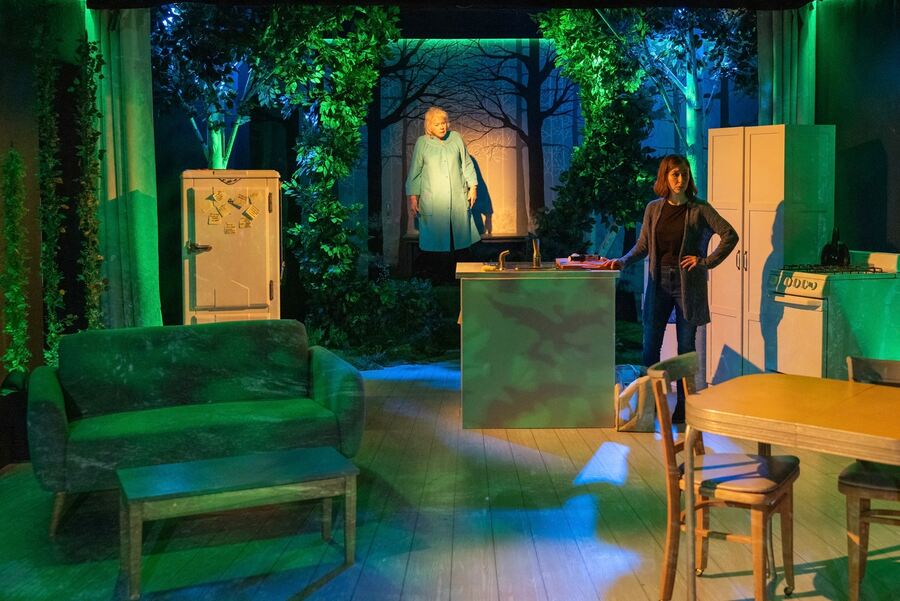
“I was so thankful that they kept the commitment to the production and ended up putting it up,” Romeo said, “because they had started building the set, they’d already cast it, and they had put a lot into it before the shutdown. So after the shutdown, they were able to come back and still do it.”
Given the state of the theatre industry and the economy, Gabe admits that he’s torn about New Jersey Rep’s current approach.
“For good or ill, and I agonize over the wisdom of this,” said Gabe, “18 months ago when we came out after COVID, SuzAnne made the decision that a good defense is an all-out offense—meaning we are going at the same pace that we did, pre-COVID. With the hope that by continuing to operate that way, we will begin to attract not only some wayward subscribers, but also to cultivate new audiences. This is a very questionable bet. We’re scheduling six new plays for next year. We’re doing seven new plays this year.”
So far he’s seen the upside of this choice. “We are getting many more new faces in the theatre,” Gabe said, “which is almost unprecedented. I’m hoping that that’s partly the result of the fact that we just came out of the chute and we came out gangbusters.”
New Jersey Rep’s current production is an NNPN rolling world premiere of Inda Craig-Galván’s Welcome to Matteson!, which runs Sept. 28-Oct. 29 after debuting at Chicago’s Congo Square Theatre earlier this month (where it runs through Oct. 1). Set outside Chicago, the dark comedy follows two Black couples, one forcibly relocated from the Cabrini-Green housing projects, the other longtime residents of the Matteson suburb, whose preconceptions about one another come to a head at a dinner party. It is an exploration of internalized racism, classism, gentrification, and housing justice that SuzAnne said was reminiscent of both Jordan Peele and Who’s Afraid of Virginia Woolf? Literary manager Joel Stone first saw the play as part of an NNPN showcase.
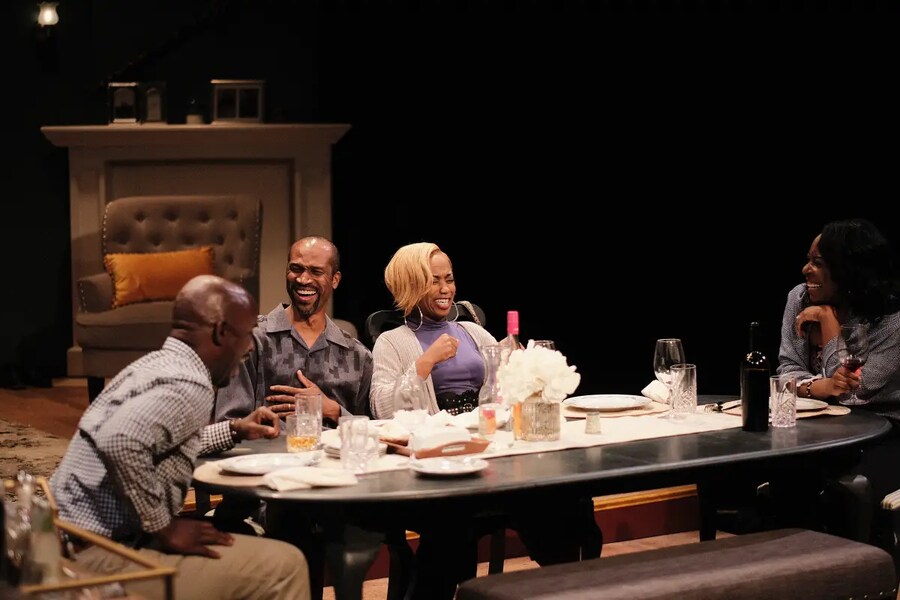
“What attracted me to it,” Stone said, “was that it is a play about class. Since there’s so much class division in this area. I was fascinated by all sorts of themes that ran through the play. I thought it was funny, dramatic, and just well written.”
Craig-Galván said she was inspired to write the play after coming across a flier that had been anonymously distributed to suburban homes around the time that residents were being relocated from Cabrini-Green in the early 2000s. It asked, “Do you want these people moving into your neighborhood?” Craig-Galván initially assumed the flier had been circulated by a racist who couldn’t stand to see economically challenged Black folks move to their neighborhood—but was later struck by the notion that those we judge and otherize can look like us.
Obviously, Chicago audiences at the Congo Square productions will tune into the play’s specific local references, but, as Craig-Galván said, “People have been displaced everywhere, people are having housing disparity everywhere, people are judging each other and not being welcoming everywhere right now. It warms my heart to have people seeing it in Chicago, but I’m glad that people are resonating with it and are going to get a chance to experience it in other places as well.”
Craig-Galván first heard about New Jersey Rep from Michael Tucker, who is not shy about sharing his enthusiasm for the company, and was impressed by its commitment to new work. While many theatres will develop new plays without the promise of a future production, she notes that the company uses a different model.
“For a theatre to not just say we support in terms of development, but to take it a step further and support in terms of an actual production is incredible,” Craig-Galván said. “With theatres closing left and right, I don’t know how they do it, but they do. It’s a model I think other folks could look at.”
While Craig-Galván has relished her collaboration with New Jersey Rep, she did note that Long Branch is a predominantly white neighborhood and the theatre’s staff is mostly white. “There was apprehension on my part,” Craig-Galván said, “because everything I write is extra Black Blackity Black. I wondered, are they going to understand this play? Are they going to understand the lived experiences of the play, aside from it being in a different geographical setting, are they going to get it?”
Her fears were unfounded, she said. “Everybody at New Jersey Rep has made sure that my vision for the play is what was being presented,” Craig-Galván said, and she approved the choice of director, Dawn Monique Williams, as well as the cast. “They wanted to do my play without making any suggestions for any changes. I worked with managing director Dee Dee Irwin there, and with Joe Trentacosta, who handles their PR, to make sure we are marketing to have Black people in the audience and to make sure they know that they are absolutely welcome and this is for them.”
A play with themes of gentrification is an apt choice for New Jersey Rep, as property values in its neighborhood have shot up since the city of Long Branch unveiled its redevelopment plan in the mid ’90s. The city used eminent domain to buy up beachfront homes in order to make way for Pier Village, a mixed-use community featuring retail, restaurants, and luxury condominiums that officially opened in 2005. This was only the beginning of the lengthy, billion-dollar redevelopment process.
“In a lot of what was once the high crime area,” said Joel Stone, “blocks have been totally torn down within the last 10 years. We still have blocks east of us heading toward the beach that are just empty lots of cleared away rubble. The whole place has changed a lot. More yuppies, more spendable income.”
Gabe and SuzAnne see themselves as guardians of a cultural space that belongs to the community. Though they’ve had plenty of offers on the property from developers, they insist they’re not in the real estate business.
“It does seem like a place that’s still in transition,” noted Jill Nagle of the surrounding neighborhood. “The funny thing is, there’s New Jersey Rep, plugging away in this spot, holding ground.”
Alexandra Pierson (she/her) is associate editor of American Theatre.


